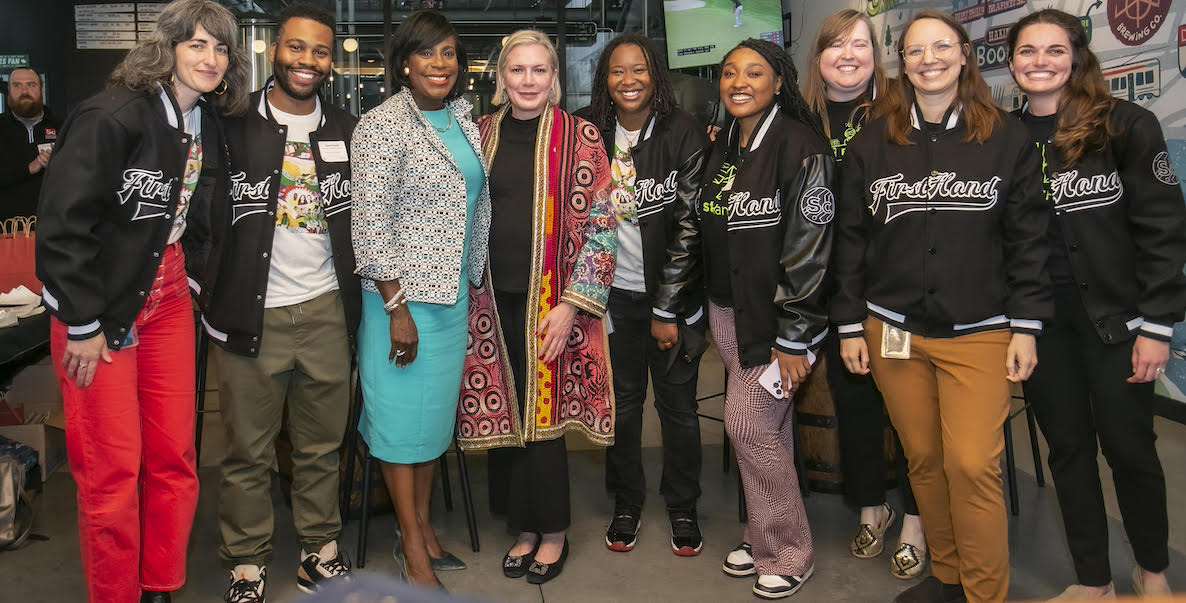Every Wednesday morning at 10am, a school bus brimming with John F. McCloskey School students pulls into its stop at 36th and Market streets. The sound of compressed air escaping its brakes is the cue these middle schoolers have been anticipating for days. They’ve spent every school day for the past week memorizing fundamental facts and formulas in classrooms. Wednesdays mean they get to apply themselves in a different, more hands-on way.
The students hop off the bus and cluster together on Market Street for a few moments before splitting off into two groups: one half crosses the street to Coded By Kids headquarters, and the other half walks into the University City Science Center’s FirstHand lab to continue their education.
These are young software developers, medical researchers and engineers in the making. In just a few years, they’ll be entering the job market or pursuing higher education with more skills, experience and know-how than many young job-seekers and students of generations past. Whether or not they stay in Philadelphia depends on how prepared our technology and life science sectors are to receive them.
Philadelphia’s unemployment rate is dropping, according to Pew’s most recent State of the City report, but progress has not been parallel across racial and ethnic demographics, nor across the city’s zip codes. These economic and social disparities have roots in educational opportunities. The skills and competencies acquired during elementary, middle and high school — and even beyond, into young adulthood — are the economic foundation from which young people can build and sustain comfortable, gratifying lives.
And yet, even in a city with a thriving innovation ecosystem, where life-saving therapies are developed and world-class technologies are built, too many young Philadelphians don’t recognize STEM fields as legitimate career pathways. They don’t perceive science and technology as industries driven by regular, everyday people. They are familiar with innovation, but don’t understand how the medicines they’ve seen their grandparents take came to be, and never saw their parents in a lab coat. They lack exposure to the process of and professions involved in STEM innovation.
We’re closer to that future today than we’ve ever been. The young students we brought into our laboratories and computer rooms 10 years ago are now breaking into the local job market and we’re beginning to see meaningful outcomes.
As two people who have led supplemental out of school STEM programming for a decade, there’s a popular refrain we often hear among our students: “I didn’t know this was something I could actually do.” It isn’t until they put on said lab coat and begin working with bioplastics, or until they sit down and start writing code or designing app concepts, that the lightbulb flashes and excitement starts to swell. Too few of our city’s youth and young adults have the opportunity to experience these lightbulb moments.
Of course, not every student will grow up to develop a new vaccine, engineer the next generation of sustainable waste management systems, or start their own tech company. But the fact remains that students everywhere, including here in Philadelphia, are vastly underexposed to possible careers in the STEM fields. They’re obtaining theoretical knowledge in schools, but without lab time and an opportunity to put that knowledge into practice, they don’t benefit from experiencing the real-world implications of what they’re learning in the classroom. That’s the other half of the formula for learning. It’s a broader flaw within our society that views our youth as students only when they’re within the four walls of their classroom. The reality is, they are students around the clock — constantly questioning and absorbing.
Philadelphia’s supplemental STEM education programs — including out-of-school-time, after-school and summer — have greatly matured over the past decade. Ten years ago, we were a patchwork ecosystem of young community-based organizations and programs at anchor institutions. And while we shared the same vision of a robust talent pipeline between Philadelphia neighborhoods and its STEM institutions and employers, in the early years of establishing our programs, we were still cultivating the partnerships and developing the curricula that would serve as the groundwork for that future.
We’re closer to that future today than we’ve ever been. The young students we brought into our laboratories and computer rooms 10 years ago are now breaking into the local job market and we’re beginning to see meaningful outcomes. The students who step off the bus at 36th and Market today are being taught and mentored by local industry professionals who play a role in designing their after school curricula, and may one day hire them. In another 10 years, when they’re tech founders, doctors, and product managers, they’ll bear the responsibility of fostering the skills of the next generation of innovators.
This cycle will continue as demand for supplementary STEM programming grows. Our city’s job market must be prepared for the influx of new, capable talent as the breadth of students with access to these programs expands. If Philadelphia’s employers want to compete in the future, they need to start building a pipeline for future innovators today. Their skills, experience, and know-how will certainly be valued elsewhere.
Maya Heiland is director of STEM Education Initiatives at the Science Center. Danae Mobley is CEO of Coded By Kids.
The Citizen welcomes guest commentary from community members who represent that it is their own work and their own opinion based on true facts that they know firsthand.
![]() MORE ON JOB TRAINING FOR THE FUTURE FROM THE CITIZEN
MORE ON JOB TRAINING FOR THE FUTURE FROM THE CITIZEN



